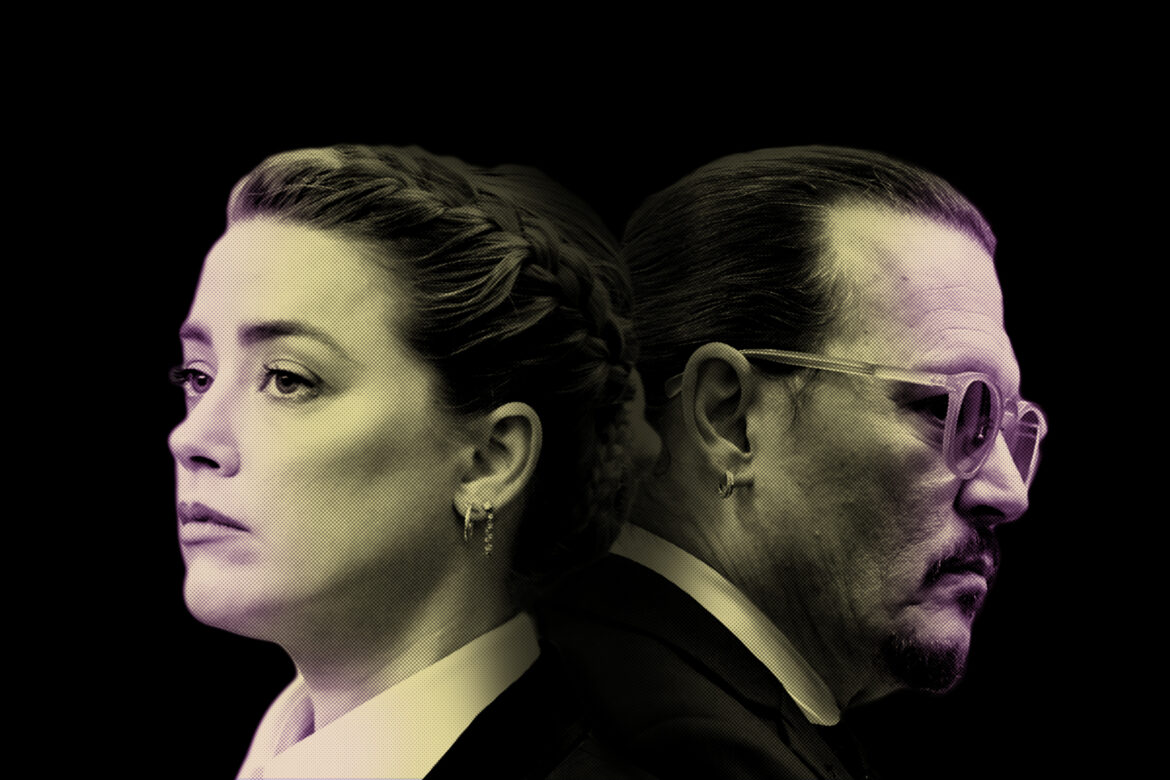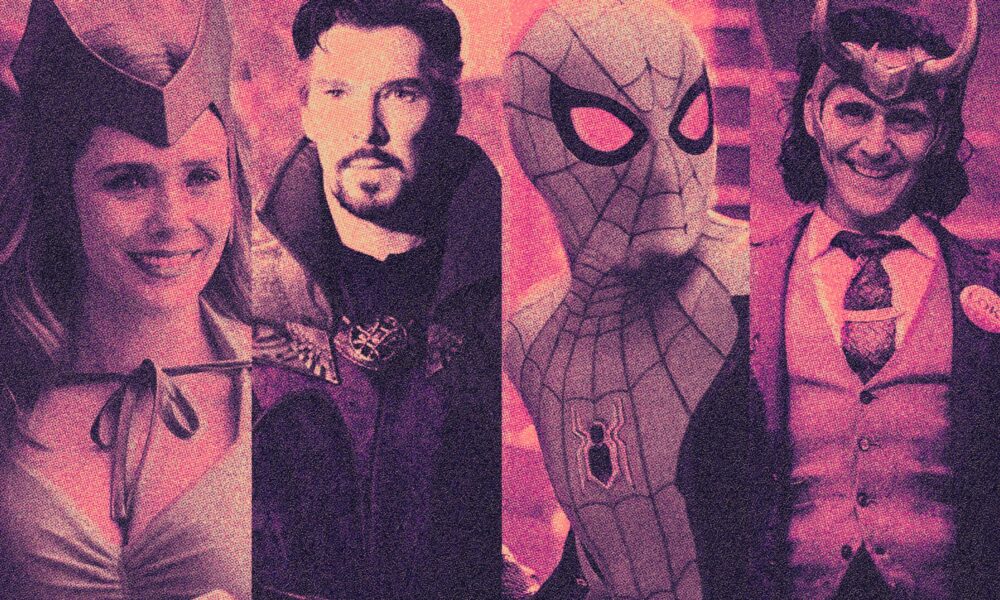Graphic by Naomi Idehen
This past summer, it seemed like every social media platform was talking about the Johnny Depp v. Amber Heard Trial. When I initially encountered the case through a livestream on TikTok, I disregarded it. I figured two white, affluent actors would be able to live their lives regardless of the outcome of the case — I know now that this case has more meaning than I assumed.
Heard is now used as an example in comments that appear at any mention of cases involving a male celebrity accused of abuse. For instance, comparisons were made between rapper Megan Thee Stallion and Heard, calling Megan a “liar” when she stood trial against Tory Lanez. These remarks have only recently been silenced as Lanez was found guilty in December.
The uproar began when Heard wrote an op-ed for The Washington Post, speaking up about her abusive relationship and experiences after coming forth about her abuse. While she does not mention a name in this article, Johnny Depp felt his reputation was on the line and sued Heard for defamation. Depp, known worldwide for his iconic roles in numerous films, won the case this past summer.
A myriad concerning posts across various social media platforms ostracizing Heard or idolizing Depp became growingly worrisome. These types of videos and posts were impossible to avoid, and they still appear months after the trial’s verdict. In addition to this, people I knew — many younger than me — started interacting with posts mocking Heard and her testimony. The most alarming fact was social media seemed to be only broadcasting one type of message: Amber Heard is a money-seeking liar and Johnny Depp bears no responsibility for abuse. Despite Depp’s known history of violence and abuse, pro-Depp propaganda was running rampant on social media — and it was working.
Propaganda functions best when an underlying bias against a certain topic exists. Gender biases infiltrate most aspects of life like employment or healthcare, but are the most dangerous in cases of abuse. Many people tend to shift the blame on victims, rather than the alleged abusers. While it’s very true that men are also victims of abuse, women face additional challenges when it comes to coming forward about abuse. In cases about rape, a significant amount of people tend to put the onus of the blame on the women themselves. This means that from the start, Heard would already find difficulty gaining support.
Some reasoned that Depp was an example of an underrepresented demographic of abuse victims because of his sex, partly contributing to an outpouring of support. It’s important to note that this case was not about him coming forward about abuse. It was about defamation because of Heard coming forward about her own abuse in an article. The verdict of the case is detrimental to efforts of abuse victims speaking up, both male and female, not an unseen demographic of abuse victims.
Many Depp supporters rallied under the false guise of supporting a minority male abuse victim. Yet, their messages in their protests suggest otherwise. Fans appeared in front of the courtroom dressed as his characters from movies. They bespoke Depp’s immense social capital, a worldwide public fondness of him and a likely reason why he won the case.
Heard stated in an interview that Depp is a beloved character in the eye of the public. Most people are more familiar with Depp and harbor a greater affection for him than Heard. This is important because abuse assumes a prerequisite of power, more specifically, an imbalance of that power. Johnny Depp, through his influence and prominence, indicatively held more power in the relationship, as well as in the public’s favor.
It’s important to consider that abusers aren’t only outcasts of society — they are often widely admired by many. They are trusted and have a network of people who can vouch for their morality. But abuse happens behind closed doors. It’s private — invisible to those not exposed to the intimate side of abusers.
Strangely, the case was widely televised. This rarely happens in Virginia, where the court hearing took place. Garnering millions of viewers, countless outside perspectives with a bias for Johnny Depp were invited in.
Considering this, it’s difficult to imagine that the media coverage had no part in influencing the verdict of the case. The polarized posts on social media and news outlets spending thousands of dollars propagating anti-Heard messages all point to a power dynamic that only Depp is able to abuse.
Even before the verdict was reached, this case played into many anti-feminist and victim-blaming antics. Not only were Depp supporters perpetuating a false image of him, but they also discredited Heard by policing her testimonies.
A common, harmful myth that this case plays into is the “perfect victim”, meaning a person has to live up to an unrealistic ideal of flawlessness to be seen as a victim. Depp supporters pointed out their dissatisfaction with Heard’s emotional expressions over the course of the trial, which never seemed to be adequate. If she smiled she’s a liar, if she cried she’s just performing. Her tone, actions and reactions were under constant scrutiny, and Depp fans used this as an opportunity to delegitimize her claims. Heard, in the eyes of many, was not a “perfect victim” — thus, not warranted to be believed.
Depp’s supporters applied makeup to mimic bruises, attempting to prove how easy it was to fake injuries from abuse. At this point in the case, it was clear that Depp’s influence was so strong that it caused women to feel the need to not only delegitimize Heard’s claims, but also spread harmful rhetoric about other abuse victims, implying they are liars.
Amber Heard will still likely be able to continue to live a comfortable life if she remains out of the public eye. The verdict of the case then, has much more dangerous implications outside of Heard’s life. If a woman like Heard, white and affluent, is unable to be believed, what does this mean for women who are not white? What does this mean for victims of abuse who are poor and have little social capital?
The #MeToo movement brought much needed nuance to sexual and domestic abuse cases. It was first used in 2006 as a social media tool for people, Black women in particular, to gain support as they came forward about abuse. The actions of those supporting Depp and the case’s verdict indicate a disturbing shift in this culture.
This case has proven that larger society remains a hostile environment for victims of abuse, especially if they are women. Whether or not you believe Amber Heard, the mere fact that people went to extensive lengths to disprove her claims is shocking and should raise a red flag. With our extremely networked society through social media, this type of behavior has catalyzed a harmful meme culture with Heard at the center that is mainly being internalized by younger demographics.
Both the behavior caused by the case, as well as the consequences of the verdict, jeopardize current and future abuse victims. Looking ahead to future abuse cases, it’s important to be vigilant about how this culture shift will treat victims in cases involving other famous male celebrities.
Later this year, British musician FKA Twigs’ court case with American actor Shia Labeouf will take place. Twigs has accused him of physical and emotional abuse, much like Heard did with Depp.
It would be disappointing — yet unsurprising — if Twigs is treated similarly to Heard. Like Heard’s experience, tactics meant to tarnish Twigs’ image will be likely to delegitimize her claims at all costs.
However, Twigs will be even more vulnerable to public scrutiny, given she has already been met with racist and sexist treatment online during her relationship with actor Robert Pattinson.
A more hopeful and effective culture around abuse remains to be seen, even in 2023.




Comments are closed.